七年级英语第七八单元知识点归纳
牛津译林版英语七年级上册分单元知识点归纳总结(Unit1-8))

牛津译林版英语七年级上册全册知识点归纳总结(最新)Unit one一、词汇知识点整理:look after \ take care of 照顾;表示look 的短语:look after照顾look at 看…;look for 寻找look like 看起来像…on the first day 在第一天Class One, Grade Seven (先说班级,再说年级,且大写)。
play football 踢足球after school 放学后be\come from 来自be good at \do well in 擅长fly kites 放风筝go home 回家listen to music 听音乐play a game 玩游戏wear glasses 戴眼镜at school 在学校all the lessons 所有的课程talk about 谈论over there 那里 a lot of hobbies 许多爱好二、结构用法:love\like doing sth 喜欢做某事let’s +动词原形让我们I am\My name is 我叫welcome to +地点欢迎来到This is 这是be good at \do well in doing 擅长做in Class…Grade…在几年级几班be from = come from + 地点, 意思是“来自某地”。
He is from Nanjing. P8 他来自南京。
live with…in…和谁住在哪里live with sb 和某人住一起;live in+ 城市名,住在某地;live on the ground floor 住在一楼(用介词on)I’m …year old. 我几岁了。
year(s) old ,……岁,如果数词大于1,year 要用复数years. 问年龄要用How old “几岁”提问。
例如:- is your sister? --- She is 11. 应填How old.I have (short/long)hair.我留着短(长)头发三、句式用法What’s your name?你叫什么名字?Nice to meet you! 很高兴见到你。
七年级英语第七八单元知识点归纳

1.teach sb to do sth.:教某人做某事2. play basketball打篮球play ping-pong打乒乓球play football踢足球3. learn to do:学做某事4.be ready for sth/be ready to do sth:准备好做某事5.like to do sth :喜欢做某事(偶然性)like doing sth:喜欢做某事(指个人习惯)6.be called:被叫做...7.cheer for:为...欢呼8.在比分中表示几比几用“to”,如:3:4读作:three to four9.be good for:对....有益,对……有好处;be bad for对……害,对……坏处10. How often:对频率进行提问表示次数:一次用once,两次用twice,三次以上:数字+times,如三次three times一周一次:once a week 一个月两次:twice a month一年五次:five times a year11. need:需要(实义动词或行为动词)need to do:需要做...12. It takes sb sometime to do sth:做某事花费某人多少时间13. for example:例如(通常放在句首)14. a helpful person:一个有益的人(person复数形式persons)15.现在分词put-putting/ run-running /shop -shopping/hit-hitting /sit-sitting /swim —swimming16. look+形容词:看起来……17. go+动词ing形式(即动名词):去做某事go swimming去游泳go shopping去购物go fishing去钓鱼go skating去滑冰go skiing去滑雪18. easy(形容词)-easily(副词)happy(形容词)- happily(副词)heavy(形容词) - heavily19. watch a basketball game观看一场篮球比赛20. against (介词)反对,违反:The tigers played against the lions.老虎队对战狮子队。
仁爱英语七年级下册unit8知识点
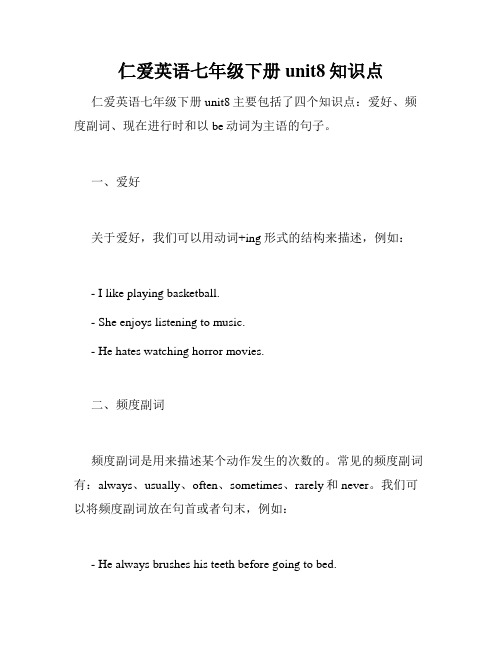
仁爱英语七年级下册unit8知识点仁爱英语七年级下册unit8主要包括了四个知识点:爱好、频度副词、现在进行时和以be动词为主语的句子。
一、爱好关于爱好,我们可以用动词+ing形式的结构来描述,例如:- I like playing basketball.- She enjoys listening to music.- He hates watching horror movies.二、频度副词频度副词是用来描述某个动作发生的次数的。
常见的频度副词有:always、usually、often、sometimes、rarely和never。
我们可以将频度副词放在句首或者句末,例如:- He always brushes his teeth before going to bed.- I usually eat breakfast at 7 o'clock in the morning.- They sometimes go to the park on weekends.- She rarely drinks coffee because it makes her nervous.- We never miss our English class.三、现在进行时现在进行时用来描述正在进行的动作,其结构为:be动词+现在分词。
例如:- He is playing basketball with his friends now.- They are watching TV in the living room.- She is studying English at the library.- We are listening to music in the classroom.需要注意的是,某些动词不宜用于现在进行时,例如感官动词(see、hear、smell、notice、feel、taste)和状态动词(be、seem、appear、look、feel、sound、taste)。
七年级上册英语七八单元知识点总结

七年级上册英语七八单元知识点总结一、七年级上册英语七八单元的重点单词1. school2. library3. cafeteria4. playground5. gym6. science7. math8. art9. music10. geography二、七年级上册英语七八单元的重点短语1. go to school2. have lunch3. play basketball4. do homework5. listen to music6. draw pictures7. study English8. read books9. write an em本人l10. sing a song三、七年级上册英语七八单元的重点语法1. 一般现在时例句:I go to school every day.2. 一般过去时例句:I played basketball yesterday.3. 一般将来时例句:I will do my homework tomorrow.4. 介词in,on,at的用法例句:I have art class on Mondays.5. 形容词的比较级和最高级例句:I am taller than my brother.6. be动词的用法例句:She is a science teacher.四、七年级上册英语七八单元的重点句型1. What do you do on weekends?答句:I play basketball on weekends.2. What does she like?答句:She likes music.3. How often do you study English?答句:I study English every day.4. Where is the library?答句:The library is next to the cafeteria.5. When does the art class start?答句:The art class starts at 2 o'clock.五、七年级上册英语七八单元的重点阅读材料1. My School介绍学校的情况,包括教室、图书馆、操场等地方。
七年级上册英语unit8知识点归纳
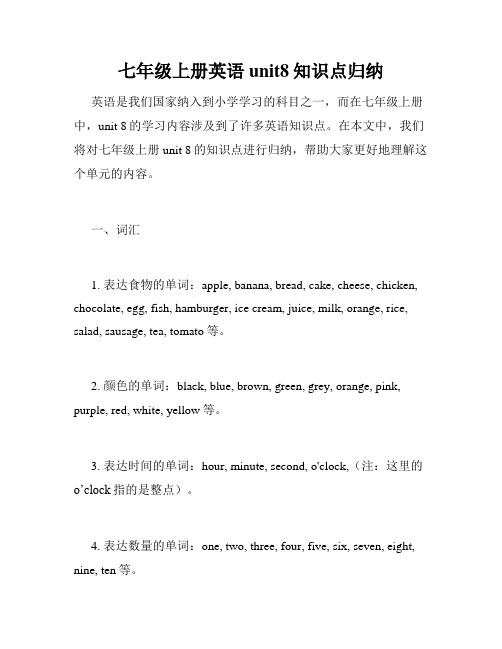
七年级上册英语unit8知识点归纳英语是我们国家纳入到小学学习的科目之一,而在七年级上册中,unit 8的学习内容涉及到了许多英语知识点。
在本文中,我们将对七年级上册unit 8的知识点进行归纳,帮助大家更好地理解这个单元的内容。
一、词汇1. 表达食物的单词:apple, banana, bread, cake, cheese, chicken, chocolate, egg, fish, hamburger, ice cream, juice, milk, orange, rice, salad, sausage, tea, tomato等。
2. 颜色的单词:black, blue, brown, green, grey, orange, pink, purple, red, white, yellow等。
3. 表达时间的单词:hour, minute, second, o'clock,(注:这里的o’clock指的是整点)。
4. 表达数量的单词:one, two, three, four, five, six, seven, eight, nine, ten等。
二、语法知识1. there be句型:表示“某地存在某物”,例如There is a pen on the table.意为“桌子上有一支笔”。
2. 简单的介词短语:指使用介词来表示两个词之间的关系。
例如:in the morning(在早上)、at night(在晚上)等。
3. 一般现在时:常用来表达日常习惯或经常发生的事情。
例如:I eat breakfast at 7:30 every morning.(我每天早上7点半吃早餐)4. 比较级的用法:用于比较两个事物的程度,添加-er或者more,例如:cat > smaller > smaller than(小猫),dog > stronger > stronger than(大狗)。
2019年七年级英语Units7-8知识点
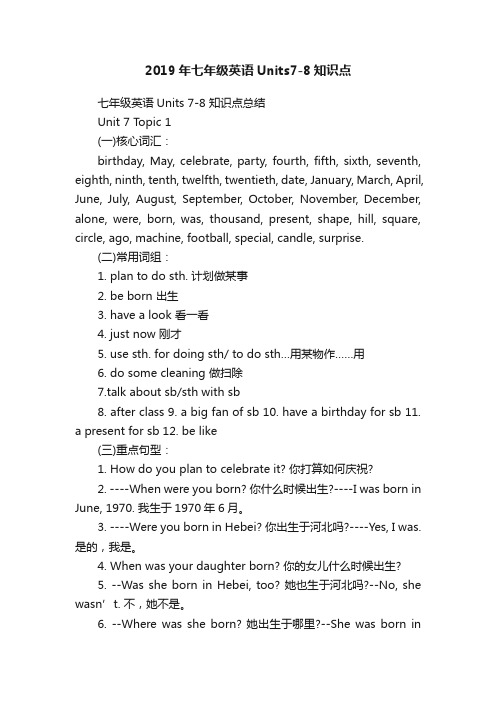
2019年七年级英语Units7-8知识点七年级英语Units 7-8 知识点总结Unit 7 Topic 1(一)核心词汇:birthday, May, celebrate, party, fourth, fifth, sixth, seventh, eighth, ninth, tenth, twelfth, twentieth, date, January, March, April, June, July, August, September, October, November, December, alone, were, born, was, thousand, present, shape, hill, square, circle, ago, machine, football, special, candle, surprise.(二)常用词组:1. plan to do sth. 计划做某事2. be born 出生3. have a look 看一看4. just now 刚才5. use sth. for doing sth/ to do sth…用某物作……用6. do some cleaning 做扫除7.talk about sb/sth with sb8. after class 9. a big fan of sb 10. have a birthday for sb 11.a present for sb 12. be like(三)重点句型:1. How do you plan to celebrate it? 你打算如何庆祝?2. ----When were you born? 你什么时候出生?----I was born in June, 1970. 我生于1970年6月。
3. ----Were you born in Hebei? 你出生于河北吗?----Yes, I was. 是的,我是。
人教版七年级英语下册第八单元知识点总结

Unit 8 Is there a post office near here?一.重点单词和短语post office邮局go straight沿着….直走police station警察局turn right=turn to the right向右拐pay phone投币式公用电话turn left=turn to the left向左转on the Fifth Avenue在第五大街go along=walk along=go down沿着……走across from在….对面on one’s left在某人的左边next to紧靠…on the right在右边between…and….在…和…之间at the first crossing 在第一个十字路口in front of在…前面welcome to…欢迎到…..in the neighborhood在附近a house with a beautiful garden一个带漂亮花园的near here在这附近enjoy reading 享受阅读take a walk=have a walk散步look like 看起来take a taxi乘出租车have a good trip旅途愉快the way to…去….的路上have fun玩到开心二.重点单词和短语1. There be句型(1)结构:There be+sb./sth.+地点表示“在某地有某人或某物”(there是引导词,没有词义;be是谓语动词;某人/物是主语,地点作状语,多为介词短语)E.g. There is a bank in the neighborhood.(2)There be句型的谓语动词be在人称和数上应以后面的第一个名词保持一致。
▲如果后面的名词是可数名词单数或不可数名词,谓语动词用is.E.g. There is some salad on the table.▲如果后面的名词是可数名词复数,谓语动词用are.E.g. There are some students in the classroom.▲如果There be句型中有多个名词,be动词通常与第一个名词保持人称和数的一致。
七年级英语Unit8Whenisyourbirthday人教版(新目标)知识精讲
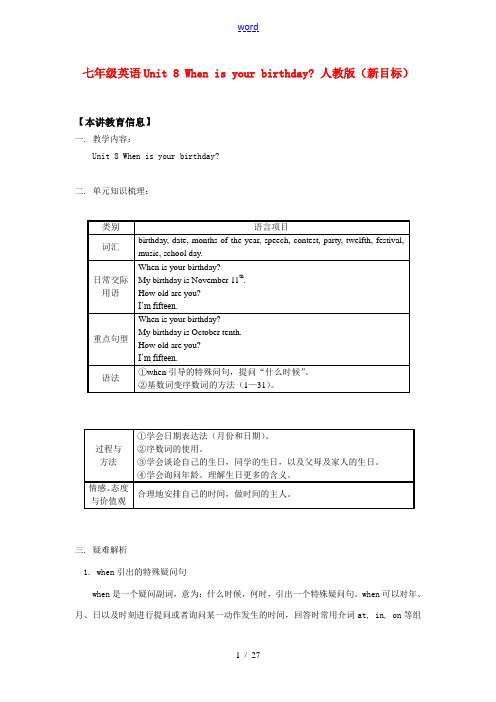
七年级英语Unit 8 When is your birthday? 人教版(新目标)【本讲教育信息】一. 教学内容:Unit 8 When is your birthday?二. 单元知识梳理:三. 疑难解析1. when引出的特殊疑问句when是一个疑问副词,意为:什么时候,何时,引出一个特殊疑问句。
when可以对年、月、日以及时刻进行提问或者询问某一动作发生的时间,回答时常用介词at, in, on等组成的表时间的介词短语。
例如:—When is your birthday?你的生日是什么时候?—My birthday is / It’s July 16th.我的生日是七月十六日。
—When do you go to school every day?你每天什么时候去上学?—I go to school at 6:30 every day.我每天6:30上学。
—When will your parents e to see you?你父母什么时候来看你?—On Sunday.星期天。
另外,除了when之外,还可用what time就时间进行提问,what time更强调“几点”。
如:—What time is it? —It’s six o’clock.现在几点钟?六点钟。
2. What year were you born?你出生于哪一年?what year表示对年代提问,相当于疑问副词when,所以该句也可用when提问:When were you born?当然用what year提问强调是哪一年出生的。
be born出生。
当我们说某人出生于某时或某地时,总是用一般过去时,即was / were born, was是am, is的过去式,were是are的过去式。
例如:—Where were you born?你出生于哪儿?—I was born in Wuhan.我出生于某某。
—When was your sister born?你的妹妹是什么时候出生的?—She was born on March 11th, 1990.她出生于1990年3月11日。
译林版牛津英语七年级下册全册Unites1-8单元知识点及语法归纳

译林版牛津英语七年级下册全册Unites1-8单元知识点及语法归纳一、重点词组、句型1、Would you like to live in the palace, Eddie? 埃迪,你想住宫殿里吗?①Would you like sth? 肯定答复: Yes, please. 否认答复: No, thanks.②Would you like to do sth? 肯定答复:Yes, I’d like/love to. 否认答复:I’d like/love to, but…2、There are twenty restaurants in town. 镇上有二十家餐馆。
There are about 8,000,000 people living in London. 大约有八百万人住在伦敦。
①表示某地有……,用there be 句型,谓语动词就近原那么。
There __________(be) an art room, a music room and two puter rooms in our school.②表示有事情要做,用there be sth to do。
Thereare lots of things ___________(see) in Beijing..③表示有某人正在做某事,用there be sb doingsth.。
On game shows, there are always famouspeople___________(talk) about their lives.3、I live in a town 15 miles from London. 我住在离伦敦15英里的一个镇上。
be far (away) from 离……远,但出现详细间隔时,不用farMy home is __________________from the school.My home is 5 kilometres ___________from the school.A. awayB. farC. closeD. next to4. have fun with sb./sth. 和某人/某物玩得开心have fun doing sth. 做某事很开心have(has/had) fun= have(has/had) a good time=enjo y(enjoyed) onself(myself/yourself/youselves……)5、I also have a bedroom of my own. =I also havemy own bedroom. 我也有自己的房间。
七年级人教版第七、八单元知识点

人教版第七单元知识点一、词汇动词:want v. 需要;想要help v. 帮助;援助come v. 来;来到buy v. 购买;买afford v. 负担得起;买得起see v. 看见sell v. 卖;销售名词:pants n.裤子sock n. 短袜shirt n. 男衬衣;衬衫T-shirt n. T恤衫shorts n.短裤sweater n. shoe n. 鞋skirt n. 裙子color n. 色;颜色sale n. 出售;廉价销售dollar n. 元(美国、加拿大等国的货币单位,符号为$)clerk n.职员;办事员price n. 价格clothes n. (pl.)衣服;服装store n. 商店example n. 例子;实例形容词:black adj. & n. 黑色(的)white adj. & n. 白色(的)red adj. & n. 红色green adj. & n. 绿色(的)blue adj. & n. 蓝色(的)yellow adj. & n. 黄色big adj. 广大的;重大的small adj. 小的;小号的short adj. 短的;矮的long adj. 长的welcome adj. 不必客气的sorry adj. 抱歉的;遗憾的;难过的数词:ten num. 十eleven num. 十一twelve num. 十二thirteen num. 十三fourteen num. 十四fifteen num. 十五sixteen num. 十六seventeen num. 十七eighteen num. 十八nineteen num. 十九twenty num. thirty num. 三十副词:very adv. 很;非常;代词:each pron. 每个anybody pron. 任何人our pron. 我们的yourself pron. 你自己(反身代词)介词:from prep. 从;从……起中二、词组:how much (价钱)多少You're welcome. 不客气on sale 廉价出售;出售at a good price 以合理的价格have a look (at…)“看一看(…)”=look (at …)for girs / boys / sports. 对姑娘/ 男孩/ 运动来说sell … to…把…卖给…buy … from…从…买…on sale在出售三、重点句型:1. How much are these pants? =What’s the price of these pants? 这条裤子多少钱?They’re twenty dollars. 这条裤子20美元。
最全面人教版七年级上册英语第八单元知识点归纳总结

Unit 8 When is your birthday?一、词汇与短语● 重点单词A部分1.when adv.(疑问副词)什么时候2.December n. 十二月3.month n. 月;月份4.happy adj. 愉快的;高兴的5.January n. 一月6.old adj. 年老的;旧的7.February n. 二月8.party n. 礼聚会9.March n. 三月10.first num. 第一11.April n. 四月12.second num. 第二13.May n. 五月14.third num. 第三15.June n. 六月16.fifth num. 第五17.July n. 七月18.eighth num. 第八19.August n. 八月20.ninth num. 第九21.September n. 九月22.twelfth num. 第十二23.October n. 十月24.twentieth num. 第二十25.November n. 十一月B部分1.test n. 测验;检査2.trip n. 旅游;旅行3.art n. 艺术;美术4.festival n.(音乐、戏剧等的)节日5.dear adj. 亲爱的6.student n. 学生7.thing n. 东西;事情8.term n. 学期9.busy adj. 忙碌的;无暇的10.time n. 时间11.there adv.(在)那里● 重点短语A部分1.how old 多大年纪;几岁了2.happy birthday 生日快乐3.in September 在九月份4.a birthday party 一个生日聚会5.at three this afternoon 今天下午三点钟6.want to come 想要来7.on May 2nd 在五月二日B部分1.an English test 一次英语测试2.a basketball game 一场篮球比赛3.a school trip 一次学校郊游4.School Day 学校开放日;学校活动日5.a book sale 一个图书售卖会6.English Day 英语节;英语日7.an art festival 一个艺术节8.Sports Day 体育节;运动会9.this term 这个学期10.on the 12th and the 15th 在十二日和十五日11.a busy term 一个忙碌的学期12.a great month 很棒的一个月13.on September 21st 在九月二十一日● 重点句子A部分1.--When is your birthday, Mary? --My birthday is on February 25th.玛丽,你的生日是什么时候?我的生日是二月二十五日。
七年级下册第八单元英语重点单词

七年级下册第八单元英语重点单词下面是七年级下册第八单元英语重点单词的详细介绍:1. advertise (v.) - 宣传,广告- The company decided to advertise their new product on television.2. amusement (n.) - 娱乐,消遣- Disneyland is a popular amusement park for families.3. atmosphere (n.) - 氛围,环境- The atmosphere in the restaurant was cozy and inviting.4. branch (n.) - 分支,部门- The company has several branches located around the world.5. construct (v.) - 建造,构建- The workers will construct a new building in the city center.6. decorate (v.) - 装饰,装修- We decorated the house with colorful lights for the holidays.7. entertainment (n.) - 娱乐- The circus provides a lot of entertainment for children.8. exhibit (n.) - 展览品- The museum has a new exhibit showcasing ancient artifacts.9. expect (v.) - 期望,预料- I expect our team to win the game tonight.10. historical (adj.) - 历史的- The city is known for its historical landmarks and buildings.11. location (n.) - 位置,地点- The movie was filmed in various locations around the world.12. perform (v.) - 表演,执行- The band will perform their new song at the concert.13. plenty (adj.) - 大量的- There are plenty of seats available for the show.14. preserve (v.) - 保护,保存- The museum's mission is to preserve and exhibit historical artifacts.15. recommend (v.) - 推荐- I highly recommend this book to anyone interested in history.16. relax (v.) - 放松,休息- After a long day at work, I like to relax in front of the TV.17. scene (n.) - 场景,景色- The movie included a dramatic scene set in a crowded marketplace.18. setting (n.) - 背景,环境- The story takes place in a small town with a beautiful natural setting.19. tour (n.) - 旅行,巡回演出- The band will go on a world tour next year.20. unique (adj.) - 独特的,独一无二的- Each snowflake is unique and different from the others.21. adventure (n.) - 冒险- They went on an adventure in the rainforest.22. ancient (adj.) - 古老的- The pyramids are ancient wonders of the world.23. architecture (n.) - 建筑- The city is famous for its modern architecture.24. attract (v.) - 吸引- The beautiful scenery attracted many tourists.25. battlefield (n.) - 战场- The battlefield is now a historical site.26. celebrate (v.) - 庆祝- We celebrated the festival with music and dance.27. charm (n.) - 魅力- The small town has a special charm that attracts visitors.28. collect (v.) - 收集- He collects rare coins as a hobby.29. costume (n.) - 服装- The actors wore traditional costumes for the play.30. creativity (n.) - 创造力- The artist's creativity is evident in her paintings.31. culture (n.) - 文化- The museum showcases the rich culture of the region.32. delicious (adj.) - 美味的- The food at the restaurant was absolutely delicious.33. discovery (n.) - 发现- The scientist made a significant discovery in the lab.34. establish (v.) - 建立- The company was established in 1980.35. explore (v.) - 探索- They plan to explore the depths of the ocean.36. famous (adj.) - 著名的- The Eiffel Tower is one of the most famous landmarks in the world.37. fashionable (adj.) - 时尚的- The latest fashion trends are showcased on the runway.38. genius (n.) - 天才- Einstein was a genius in the field of physics.39. historic (adj.) - 历史性的- The signing of the Declaration of Independence was a historic event.40. impress (v.) - 给人留下深刻印象- The speaker impressed the audience with her knowledge.41. masterpiece (n.) - 杰作- The painting is considered a masterpiece of art.42. mysterious (adj.) - 神秘的- The ancient ruins hold many mysterious secrets.43. palace (n.) - 宫殿- The palace is now a popular tourist attraction.44. romantic (adj.) - 浪漫的- The couple had a romantic dinner on the beach.45. spectacular (adj.) - 壮观的- The fireworks display was spectacular.46. tradition (n.) - 传统- The festival is a important part of the local tradition.47. treasure (n.) - 宝藏- Pirates searched for hidden treasures on the island.48. variety (n.) - 多样性- The market offers a wide variety of fresh fruits and vegetables. 49. valuable (adj.) - 有价值的- The antique vase is very valuable.50. worldwide (adj.) - 全世界的- The charity organization operates worldwide to help those in need. 51. architecture (n.) - 建筑- The architecture of the ancient temple is a marvel of engineering. 52. ballet (n.) - 芭蕾舞- She dreams of becoming a professional ballet dancer.53. cherish (v.) - 珍爱,珍视- He cherishes the memories of his childhood.54. civilization (n.) - 文明- The ruins of the ancient civilization have fascinated historians. 55. composer (n.) - 作曲家- Beethoven is one of the greatest composers in history.56. congratulate (v.) - 祝贺- We congratulated him on his graduation.57. contribution (n.) - 贡献- His contributions to science have been invaluable.58. cooperate (v.) - 合作- The two companies decided to cooperate on a new project.59. coordinate (v.) - 协调- She coordinates the activities of the volunteer group.60. creation (n.) - 创造,创作- The painting is a masterpiece of human creation.61. creative (adj.) - 创造性的- She has a very creative mind and comes up with unique ideas.62. curiosity (n.) - 好奇心- His curiosity led him to explore the unknown.63. demonstrate (v.) - 展示,证明- The scientist demonstrated the principles of physics through experiments.64. delicate (adj.) - 精致的,脆弱的- The porcelain vase is delicate and requires careful handling.65. digest (v.) - 消化,理解- It took him a while to digest the complex information.66. dimension (n.) - 尺寸,维度- The sculpture adds a new dimension to the art gallery.67. dominate (v.) - 支配,占优势- The tall skyscrapers dominate the city skyline.68. efficient (adj.) - 高效的- The new technology has made the manufacturing process more efficient.69. eliminate (v.) - 消除,排除- The company aims to eliminate waste in its production.70. empire (n.) - 帝国- The Roman Empire was one of the largest empires in history.71. enable (v.) - 使能够,使可能- The scholarship enabled him to pursue his dream of studying abroad.72. enthusiastic (adj.) - 热情的- She is enthusiastic about her new role in the theater production. 73. estimate (v.) - 估计,评估- The engineer estimated the cost of the construction project.74. evaluate (v.) - 评价,评估- The teachers evaluated the students' performance through tests and quizzes.75. exceed (v.) - 超过,超出- The sales of the new product exceeded expectations.76. extraordinary (adj.) - 非凡的,特别的- His extraordinary talent in music has earned him international fame.77. facilitate (v.) - 促进,使容易- The new software facilitates communication between team members.78. fundamental (adj.) - 基本的,根本的- Education is a fundamental right for every child.79. genuine (adj.) - 真正的,真诚的- The painting is a genuine masterpiece by the famous artist.80. hilarious (adj.) - 滑稽的,好笑的- The comedy show had the audience in stitches with its hilarious jokes.81. impress (v.) - 给人留下深刻印象- The impressive performance of the young athlete won him a gold medal.82. initiative (n.) - 主动性,倡议- The government launched an initiative to promote environmental awareness.83. intelligent (adj.) - 聪明的,智能的- The intelligent robot can perform tasks with minimal human intervention.84. masterpiece (n.) - 杰作- The novel is considered a masterpiece of literature.85. motivate (v.) - 激励,激发- The coach motivates the team with his positive attitude.86. mystery (n.) - 谜,神秘- The disappearance of the ancient civilization remains a mystery.87. obstacle (n.) - 障碍- Overcoming obstacles is a part of the journey to success.88. opportunity (n.) - 机会- The internship provided her with valuable opportunities to learn and grow.这些是七年级下册第八单元英语重点单词的详细介绍。
+Unit+7-8+短语背诵+2023-2024学年人教版七年级英语上册+

人教版英语七年级上册Unit 7-Unit 8短语背诵短语在英语学习中起着至关重要的作用,接下来我们为大家列出了人教版英语七年级下册第7-8单元的重点短语,可供大家记忆。
Unit 7 It’s raining.1、in Beijing在北京2、play computer games玩电脑游戏3、watch TV at home在家看电视4、How's it going !最近过得怎么样?5、play basketball with some friends和一些朋友打篮球6、at the park在公园;in the park在公园7、sound like听起来好像8、have a good time玩的开心9、be at home在家;be not at home不在家10、be here在这儿;be not here不在这儿11、study at home在家学习12、take a message for sb. 为某人捎个口信13、tell sb. to do sth. 叫某人做某事;tell sb. not to do sth. 叫某人不做某事举一反三:ask sb. to do sth.叫某人做某事;ask sb. not to do sth叫某人不做某事14、no problem没问题15、do my homework做我的家庭作业16、in the evening在晚上17、right now刚才18、every Saturday每个星期六19、make a very good soup煲的一手好汤20、talk on the phone电话交流21、for three hours长达三小时22、every day每天23、in picture d 在图d当中。
24、have a great time玩的开心举一反三:have a good \ great time = have fun = enjoy oneselfhave good time doing sth. 做某事玩的开心25、work here在这儿工作26、summer school暑假学校27、learn a lot学到很多28、some of my old friends我的一些老朋友29、be happy to see很高兴看到30、by the pool在池边31、drink orange juice喝橙汁32、see you soon不久见33、summer vacation暑假34、study hard努力学习35、be on vacation在度假36、in the mountains在山上37、want to do sth. 想要做某事38、call sb. at...打电话给某人39、write to sb.写信给某人40、in your country在你的国家41、just right for walking刚好适合走路42、see you next month下个月见43、wear hats戴帽子44、wear a hat45、take home带回家46、In a park在一个公园47、in the snow在雪中48、skate on a river在河面上滑冰49、take photos照相50、speak to sb. 跟某人通话51、read a book=read books看书52、in my room在我的房间里面53、in the rainy weather下雨天Unit 8 Is there a post office near here?1、post office邮局2、near here在这附近3、on Bridge street在桥街上4、across from在对面5、next to 挨着6、between... and...在两者之间7、in front of在前面;in the front of...在前部8、around here=near here在这周围9、far from here离这儿很远10、walk with sb. 和某人一起走路11、police station警察局12、pay phone付费电话13、go along沿着走;walk along \go down14、turn right向右转15、turn left向左转16、excuse me打扰一下17、on the right在右面;on the left在左边18、at the first crossing在第一个十字路口19、on your left在你的左边;on your right在你的右边20、in my neighborhood在我家附近21、spend time there在那儿度过时间22、on weekends=on the weekend在周末23、watch sb. doing sth. 看见某人正在做某事(强调正在发生);watch sb. do sth. 看见某人做某事(强调全过程)举一反三:类似的词see sb. doing sth.\ see sb. do sth.24、look like看起来像25、walk out走出去26、at the park = in the park在公园27、in life在生活中28、be free自由、免费;be free to do sth.自由的做某事29、get to the park到达公园;get home回家;get there到那儿;come here来这儿(注意:home ; here; there前面不加to30、have to必须、不得不31、live in...居住在...32、enjoy doing sth. 喜欢做某事\ 享受做某事33、read books\read a book看书34、the best thing最好的事情35、go shopping去购物;go swimming 去游泳;go fishing去钓鱼;go climbing the mountains去爬山36、near my house在我家附近37、like to do sth. \ like doing sth.喜欢做某事38、your favorite place你最喜欢的地方;one’s favorite某人最喜欢的39、in your neighborhood在你家附近40、be very busy非常忙;be busy with sth.忙于...;be busy doing sth.忙于做某事41、on school days在上学的日子;on school nights在上学的晚上42、spend time with sb. 花时间和某人在一起;spend time on sth.花时间在某方面;spend time doing sth. 花时间做某事43、make the foods制作食物;make breakfast做早餐44、play Chinese chess with sb.和某人一起向中国象棋45、be good at ... 擅长...同学们,以上就是人教版英语七年级下册第7-8单元的一些短语,希望对你们有所帮助!。
冀教版七年级上册第八单元英语单词讲义速记

七年级上册第八单元单词讲义1.direction n. 方向【词根词缀:di-分离 + -rect-正,直 + -ion名词词尾】2.north n.&adv. 北方northern adj. 北方的3.south n.&adv. 南方southern adj. 南方的4.west n.&adv.西方western adj. 西方的5.east n.&adv.东方eastern adj. 东方的6.point v. 指:指向n. 要点;得分【拉丁语动词pungere(刺)的过去分词punctum,进入古法语为point,被英语借用。
-punct-刺,点-----point】7.country n. 国家【来自counter-,相对,原指相对于他国而言的本国土地,即国家。
后相对于城市而言的土地,即乡村。
】8.grandparent n. (外)祖父;(外)祖母【grand + parent】9.southeast n.&adv. 东南【south + east】10.U.S.(=United States) 美国11.soon adv. 不久【字母组合oo在大多数情况下读/uː/,符合这项读音规则的拼读模式有--oon等--oon /uːn/moon n. 月亮noon n. 正午spoon n. 勺子soon adv. 不久;一会儿】12.invite v. 邀请【in +vite字母i读本音,e不发音】invitation n. 邀请【invite将e变a再加tion】13.everyone pron. 每个人;所有的人【every + one】注:在一般现在时和一般过去时中动词用第三人称单数14.Sydney 悉尼15.London 伦敦【l + on d + on】16.capital n. 首都【英语单词capital来自拉丁语capitale,而capitale是形容词capitalis(主要的、头的)的名词形式,原意为“头、首领”,还可以表示牲畜的“头数”。
人教版七年级英语(上册)各单元语法梳理
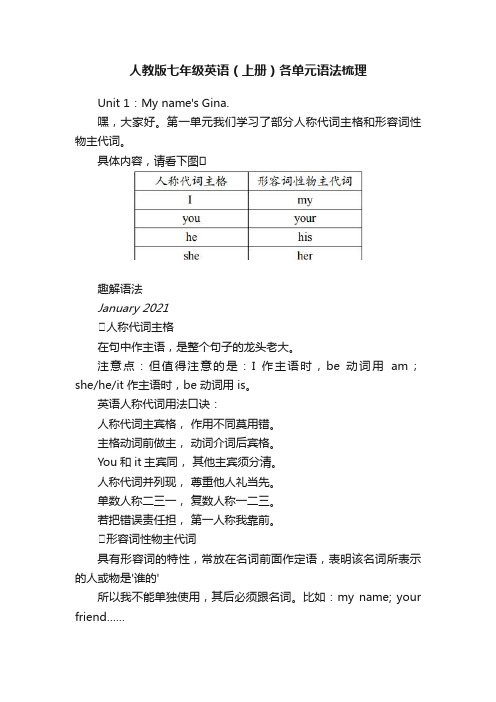
人教版七年级英语(上册)各单元语法梳理Unit 1:My name's Gina.嘿,大家好。
第一单元我们学习了部分人称代词主格和形容词性物主代词。
具体内容,请看下图趣解语法January 2021✍人称代词主格在句中作主语,是整个句子的龙头老大。
注意点:但值得注意的是:I 作主语时,be 动词用am;she/he/it 作主语时,be 动词用 is。
英语人称代词用法口诀:人称代词主宾格,作用不同莫用错。
主格动词前做主,动词介词后宾格。
You和it主宾同,其他主宾须分清。
人称代词并列现,尊重他人礼当先。
单数人称二三一,复数人称一二三。
若把错误责任担,第一人称我靠前。
✍形容词性物主代词具有形容词的特性,常放在名词前面作定语,表明该名词所表示的人或物是'谁的'所以我不能单独使用,其后必须跟名词。
比如:my name; your friend……英语物主代词用法口诀:物主代词分两种,形容词性名词性。
形容词性能力差,自己不能来当家。
句子当中作定语,身后定把名词加。
物主代词名词性,相当名词可单用。
句中充当主宾表,身后没有名词影。
两种代词形不同,添个 s 形变名。
his,its不用变,my变mine要记清。
话不多说,我们给大家来一些例证吧!✍经典例句1人称代词主格1. I am a girl. 我是一个女孩。
2. He/She is my friend. 他/她是我的朋友。
3. You are very nice. 你非常好。
4. It is a bed. 它是一张床。
2形容词性物主代词5. My name is Mary. 我的名字叫玛丽。
6. Your room is so tidy. 你的房间很整洁。
7. This is his/her pen. 这是他/她的钢笔。
8. That is my dog. Its name is Susan.那是我的狗。
它的名字叫苏珊。
9.He's a student. His mother is a teacher.他是一名学生。
英语七年级下册第八单元笔记

英语七年级下册第八单元笔记Unit 8 My DayPart 1 Vocabulary1. alarm clock (n.) - a clock with a loud noise that wakes you up in the morningExample: I set my alarm clock for 6:00 AM every day.2. diary (n.) - a book where you write your thoughts and experiencesExample: I keep a diary to record what happens in my life.3. have breakfast (v.) - to eat a meal in the morningExample: I always have breakfast before I go to school.4. go to school (v.) - to travel to a place of education to learnExample: I go to school from Monday to Friday.5. do homework (v.) - to complete tasks assigned by a teacherExample: I have to do my homework before I can play with my friends.6. watch TV (v.) - to view programs on a televisionExample: I like to watch TV in the evening with my family.7. have dinner (v.) - to eat a meal in the eveningExample: My family and I have dinner together every night.8. go to bed (v.) - to lie down in order to sleepExample: I go to bed at 10:00 PM every night.Part 2 Expressing Time- At + a specific time (at 7:00 AM)Example: I wake up at 7:00 AM every day.- In + a specific period of time (in the evening)Example: I like to read in the evening.- On + a specific day (on Monday)Example: I have swimming practice on Monday.Part 3 GrammarPresent Simple Tense- Subject + Verb (in base form) + ObjectExample: She eats breakfast in the morning.- For habits or routinesExample: I brush my teeth before going to bed.- For facts or general truthsExample: The sun rises in the east.- For schedules or timetablesExample: The train arrives at 5:00 PM.Part 4 ConversationA: What time do you wake up?B: I wake up at 6:30 AM.A: What do you do after waking up?B: I brush my teeth and have breakfast.Part 5 WritingWrite a diary entry about your daily routine.- Mention what time you wake up, go to school, do homework, have dinner, and go to bed.- Write about your favorite activities during the day.- Use the present simple tense to describe your routine.Overall, Unit 8 covers vocabulary related to daily routines, expressing time, the present simple tense, conversation practice, and diary writing. Mastering these concepts will help students effectively communicate their daily activities and routines in English.。
- 1、下载文档前请自行甄别文档内容的完整性,平台不提供额外的编辑、内容补充、找答案等附加服务。
- 2、"仅部分预览"的文档,不可在线预览部分如存在完整性等问题,可反馈申请退款(可完整预览的文档不适用该条件!)。
- 3、如文档侵犯您的权益,请联系客服反馈,我们会尽快为您处理(人工客服工作时间:9:00-18:30)。
一、第七单元知识点:
1. 过去式的构成:动词的过去式通常是在词尾加上-ed,例如:play - played, walk - walked。
2. 不规则动词的过去式:有一些动词的过去式形式不规则,需要特别记忆,这些动词的过去式形式是独特的,例如:go - went, buy - bought。
3. 过去时间的表达:过去发生的动作和状态,通常使用过去式来表达,例如:I played soccer yesterday.(我昨天踢足球了。
)
5. 对过去经历的询问和回答:我们可以使用过去式的疑问句来询问过去的经历,回答过去的经历时,通常使用表示过去时间的副词,例如:Did you go to the park last weekend? Yes, I went to the park
last weekend.(你上周末去过公园吗?是的,我上周末去过公园。
)
6. 在口语中,一般过去时和过去时间的表达还可以使用“used to + 原形动词”的形式,表示过去的习惯或状态,例如:I used to play basketball when I was young.(我小时候经常打篮球。
)
二、第八单元知识点:
1. 表示未来时间的表达:未来时间通常使用一般将来时来表达,一般将来时使用助动词will加上动词原形,例如:I will go to the beach tomorrow.(我明天要去海滩。
)
2. 表示将来计划和打算的表达:我们可以使用“be going to + 动词原形”的形式表达将来的计划和打算,例如:I am going to study English next week.(我下周要学习英语。
)
3. 表示将来时间的副词:通常和一般将来时连用,例如:tomorrow (明天)、next week(下周)、in the future(在将来)等。
4. 对将来的询问和回答:我们可以使用一般将来时的疑问句来询问将来的计划和打算,回答时通常使用表示将来时间的副词,例如:Will you go shopping tomorrow? Yes, I will go shopping tomorrow.(你明天要去购物吗?是的,我明天要去购物。
)
以上就是七年级英语第七八单元的知识点归纳。
这些知识点包括了过去式的构成、不规则动词的过去式、过去时间的表达、表示过去频度的副词、对过去经历的询问和回答,以及表示未来时间的表达、表示将来计划和打算的表达、表示将来时间的副词、对将来的询问和回答等。
通过学习这些知识点,学生能够更好地理解和运用过去时和将来时的语法规则,提高英语口语和写作能力。
